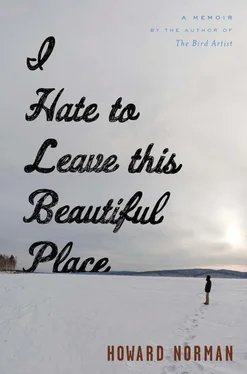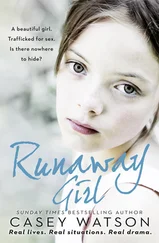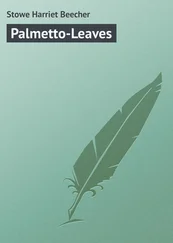“I showed Mathilde some of my writing.”
“What did she say about it?”
“She suggested hotel work — for the time being.”
“See, brilliant minds think alike. There’s worse things than hotel work, let me remind you.”
Each night a candle was added to the menorah on Isador’s kitchen table; each night another conversation about the ongoing soap opera, as Isador called my life. By the eighth night, he’d narrowed his tolerance for my unwillingness to see the truth. “Once and for all, here’s my understanding of everything with this,” he said. “Your Mathilde’s got bigger appetites for life than you have. God in heaven, you can’t even read half the same menu she’s reading. So what’s your choice? Savor the time you have with this Mathilde, for as long as one of her appetites is for you. Count your blessings. Let me put this in an old immigrant’s way: she’s got a lot of stickers on her steamer trunk.” (I’ve never since been able to see, in a photograph or movie, world travelers about to embark on, say, a 1930s luxury liner, standing on the dock next to their big steamer trunks festooned with travel stickers, without thinking of Isador saying this to me.) “Now, can we please try and enjoy the last night of this ancient holiday without you sounding like such a pitiful shmuck? Meshugga, so worked up! It’s like you’ve forgotten how to take a piss. Forgotten how to lift a fork to your mouth. You aren’t thinking of doing anything harmful to yourself, are you?”
Roughly a month after I’d first met Mathilde, I got Isador to go with me to my favorite birding haunt near Port Medway, about a two-hour drive from Halifax. This was, believe me, a triumph of Herculean dimensions, getting Isador Sarovnik out to a beach. Through stubborn persistence I’d managed to persuade the editor of the travel section of the Sunday Halifax Herald to commission an article on a protected bird preserve. I felt this to be the start of something substantial, possibly even a career. Once I’d informed Isador and asked him to accompany me, he said, “Sure, why not? I’d just as soon drop dead out by the Atlantic Ocean as anywhere, what’s the difference? Besides, I need the actual evidence of you earning some money, being a solid citizen. You can take your millions and buy your Mathilde some paintbrushes. How much are they paying you, this newspaper, to write about birds?”
It was $150, but the way I put it was, “Over four months’ worth of rent.”
It was early October, warm and windy on the rocky beach. “This is Canada,” Isador said. “Winter can arrive suddenly, on a whim. So I’m wearing more layers than a layer cake.” He had napped on the drive out. I sat him down in a folding chair out of the wind, between boulders, facing the sea. I stuck an umbrella fixed to a long pole in the sand, supplied him with water and lemonade, a makeshift oasis.
“I have mixed feelings about the ocean,” he said when he had settled in. “Some days I have real affection for it. Other days I feel otherwise.” I walked back and forth along the beach, taking notes on what late-staying sea and shore birds I could find, checking identifications against my field guide. When I got back to Isador, he said, “I’ve been thinking. Now that we’re out here, can you arrange for a nice duck for supper? I’m in good standing with the hotel chef.”
“Maybe next time,” I said. “I’m going to sit with you for a while, then I have to walk to the marsh — that’s the actual place I’m commissioned to write about. Are you going to be all right?”
“You put too much sugar in the lemonade,” he said. “You know, I look at the ocean and I think, I never learned to swim. Lucky thing I didn’t fall off the boat that brought me to Canada. Some people, and I saw this with my own eyes, jumped off the ship halfway between there and here. No matter how bad things had gotten for them before, they figured it was going to get worse.”
“You don’t know all the reasons, Isador.”
“I’m only saying, I saw it with my own eyes.”
I sat drinking lemonade with him, talking about this and that.
“This is a comfortable chair you provided for me here,” he said. “If I ever get to go on an ocean cruise, I’d like this chair. Do they let you bring your own chairs?”
“I don’t know.”
“Coming over from Europe, that’s not what I’d call an ocean cruise.”
“No, I guess not, Isador.”
“I had a change of clothing and my childhood menorah. That’s it.”
“You told me.”
“That was a rough passage. Nobody knew their fates. Nobody knew what was what. What was this place Canada, anyway? Still, Jewish children from many countries were conceived on shipboard those weeks. How anyone found privacy on that ship beats me. A hotel, now that’s a different story. But a ship full of refugees — really something, don’t you think?”
“Yes, I do. Would you like to get back to the city now?”
“You said you had more you needed to look at.”
“I can come back, if you’re too tired.”
“In a little while. This umbrella is nice. Let me ask you something. What’s with you and birds, anyway? I don’t understand.”
“I look at those sea ducks and I wonder where they go at the end of a day.”
“What’s the mystery? At the end of the day they go home. What’s there to figure out?”
“Want to look at sea ducks through these binoculars? They have beautiful faces.”
“I prefer the pigeons of my Russian youth. I close my eyes and see them. For this I don’t need binoculars.”
“I’ll be back in an hour, probably. No more than two.”
Later that October, Mathilde and I drove out to Peggy’s Cove, mainly to walk on the beach, catch the last autumn sun, and have lunch at the Oyster Café. In the car, I offered the fact of my having been at the Woodstock music festival back in August as a bona fide of worldliness. This didn’t have the effect I’d hoped for. Mathilde listened intently, as focused as a stenographer who would be responsible for reading back a transcript, as I described what I’d seen and heard in the muddy fields and hills of Yasgur’s upstate New York property. I dropped the names of musicians, some of whom I saw perform: Janis Joplin, Jimi Hendrix, the Incredible String Band, Richie Havens, Canned Heat, the Who, Joan Baez, and Crosby, Stills, Nash & Young. I mentioned that I saw a lot of people making love on rubber rafts on a pond. I told her I had the use of a cottage in Jeffersonville, not far from the festival site, owned by the poet Jerome Rothenberg and his wife, Diane, in dairy farm country.
When I had finished my recollections, Mathilde, between kissing my ears and mouth with big smacking noises and mussing my hair, all teasing sweetness, interrogated me, hoping to discover to what extent I’d authentically experienced things at Woodstock. “So you probably had a bath every night,” she said, “at your friend’s cozy little cottage, right? Did you have any luck in the fucking-in-the-pond department? Did you get hypnotized by what’s-his-face, the Maharishi-something? Did you get all crazy and slide on your bare ass in the mud? You tell me, but my guess is, no to all of the above.”
“I had a very good time listening to the music,” I said. “Mostly I sat on a hill way back from the stage and looked at the performers through binoculars. Is that what you wanted to hear?”
“Oh, I’ve hurt your feelings.”
“No, it’s just that I thought I’d had a better time than I obviously did.”
Mathilde attempted a reconciliation. She held my hand in hers and said, “If I were there, I’d have wanted to sit in that bathtub with you. I don’t need a pond. I prefer a bed. I’m glad you had a nice time.”
Читать дальше












